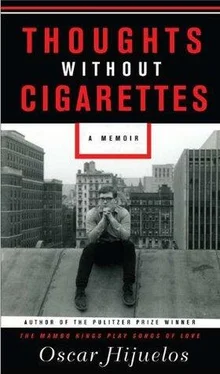Sooner or later on those nights, while the music flowed out of the living room record player, which, as with most of our furniture, had been left behind for us by my aunts, with the lights turned low while my mother remained in the kitchen tending to the food or finishing up with the dishes, my father, a sucker for flirtation and a suave rumbero , especially after he’d had a few drinks, took to the dance floor, smitten by some woman’s engaging glance. By the time my mother finally left the kitchen, she hardly cut an exuberant figure like some of the dolled-up femmes fatales in their tight dresses, whom she thought of as lowlifes. She’d sit back on the couch, her arms folded stiffly across her lap, and, neither drinking nor feeling as jubilantly alive as the other women, take in the proceedings rather somberly.
I suppose that kind of generic Cuban scene of food, drinks, and dancing unfolded in similar apartments across the city circa 1953–54, but in our case, those evenings usually ended on a sour note: For once everybody finally cleared out at some late hour of the morning, leaving behind a disaster of half-finished meals and cigarette-buttfilled glasses everywhere, my mother, unable to forget and forgive my father’s treatment of her, would have it out with him. Down the hall in bed, my brother, José, in the room right next to mine or, if we had boarders, in the same room with me, I’d sometimes hear them tormenting each other at night, and loudly so, as if we, their kids, were deaf. And sometimes, I swear, it seemed that we heard things crashing against the walls, plates breaking, hitting noises, and cries — at which point my brother would get out of bed to see what was going on, only to return in tears, having gotten slapped in the face for his trouble. (Here I have to interject that it was from those days onward that my brother formed a poor opinion of my father, a stance that led some years later to out-and-out fights between them on the street, though I never witnessed such and still find that notion hard to believe.)
Not to say, however, that my parents were always at each other’s throats; to the contrary, in calmer times, they had their share of laughs and moments of tenderness. He’d sometimes come home with some gift for her, a bottle of perfume or a pair of earrings bought from one of those enterprising vendors who’d go from hotel to hotel, selling goods to the staff at cheap prices. (He must have known every Latino “whole seller” from the Bowery to the Bronx.) Sometimes, I’d see her in the mornings, standing at the end of the hallway by the front door, straightening the knot of his tie and patting down the shoulders of his coat as he’d head out to work. And the fact remains that, however much his attentions may have wandered, they, as a couple, surely fooled around a lot. Once, while crawling across the floor as an infant, I discovered under their bed a white pan of water — a palangana —in which floated a wildly distended and somewhat forlorn-looking used condom, which I hadn’t the slightest idea about. (At the same time, I can’t help thinking of that discovery now without recalling how, on some nights, I’d hear her agitated cries, perhaps of pleasure.) And, as a family, we went places: to Coney Island in the summer, and at Christmas to Macy’s for an annual visit to see Santa Claus, or Santa Clows, as my mother pronounced it.
As for the static between them, if it affected me badly, I have no recollection of feeling that way — what was I but a little kid anyway?

Which brings me to that journey I made with my mother and brother to Cuba, in the summer of 1955: It was my father, perhaps in a spirit of largesse or reconciliation, who had paid for our airfares out of his Biltmore wages—$42.50 a week, plus whatever he made in overtime — probably in cash, as he did with all our bills, and since Borja still worked for Pan American airlines, as a bilingual ticket agent in Miami, she had probably gotten him a really good deal for our flight.
I don’t recall much, if any, fanfare at our departure, or if my father had even been on hand to send us off — my guess is that he’d gone to his job at the Biltmore — but on a certain morning in late June, someone drove us to Idlewild Airport (now JFK), where we eventually boarded a Pan American airlines clipper for Havana. Since I can’t conjure a single moment in later years of my mother ever once relaxing, for even a second, it’s hard to imagine that she behaved any differently that day: too fastidious (and vain) to have chewed on her fingernails, when not chatting wildly away with some newfound Cuban acquaintances across the aisle in her one-thousand-words-a-minute Spanish, she, hating to fly, would have been on the edge of her seat and desperate for distractions. I seem to recall that she’d sit very still, back upright, hardly moving at all, as if to do so would have magically jostled that avion out of the sky. When the stewardess served us wax-paper-wrapped ham-and-cheese sandwiches, my mother could hardly take more than a few bites. She sighed a lot, looking off into the distance. Later, though she was a first cousin to anxiety, but never imbibed as much as a drink, she must have wanted to during the final leg of our vuolo.
The flight took some three hours and had been routine enough until, while crossing over the Florida straits on our approach to Havana, something ignited inside the airplane’s left wing fuselage, and just like that, flames started shooting out of its engines. Billows of thread-ridden plumes of smoke, like a rocket’s exhaust, spilled into the surrounding clouds, and those silvery gold sheaths of fire seemed to roll back and forth over the wingspan. As the engines sputtered, then fell dead, so exciting to a child but terrifying to adults, the plane breathing ever so heavily, my mother, like so many others around us, made the sign of the cross and began to pray and pray, as if the world were about to end; then she took hold of our hands, squeezing them tightly and only letting go when, after a bumpy descent, we’d miraculously landed safely.
There, in Havana, along the periphery of the airport, royal palms rose in the distance, the sky ever so blue, and as the cabin hatches sprang open and the dense tropic humidity warmed the compartment, we waited while a ground crew wheeled a mobile stairway up to the doors. Shortly, along with a retinue of Cubans and any number of festive, perhaps blasé tourists and commuting businessmen, we disembarked from that clipper and stepped onto the tarmac, where I first breathed the Cuban air.
Later, we caught a bus for Holguín, and during that twelve-to-eighteen-hour journey (I’ve heard both numbers) as we crossed Cuba, mainly in the dead of night, going from little pueblo to pueblo along the northern coast toward the east, I apparently did not turn out to be a very good traveler. Could have been the intense humidity, or some on-the-run snack we’d picked up from one of the vendors swarming the dusty station stops, but the more deeply we entered Cuba, the more I trembled from chills, squirming about on my mother’s lap. Soon enough, whatever I had come down with spread into my guts, so each time we stopped, I’d get off the bus, my mother holding my hand, to vomit into the darkness. (My brother, José, has told me that I did so over and over again.) At some point, my face drained of color, I fell limply asleep on her lap, my mother peering down at me. I have a memory of the bus pulling into another stop, my mother fanning herself with a newspaper, Cuban voices murmuring from the road, where the male passengers, taking a break, stood about outside puffing madly, and inseparably so, on their cigars, columns of bluish smoke curling around them like incense, an almost impossibly loud chorus of cicadas — night bells — sounding from the brush, moths crawling about in agitated circles on the windows, clouds of gnats swirling around the lantern lights. En route again, as I looked out the bus windows, I doubtlessly saw wonderful things: the ocean horizon, like a rising plain reaching up to all the stars, then endless fields of sugar and pineapple, and forests passing, their silhouettes so reminiscent not of vegetation but of contorted shadows standing at attention in row after row, like the dead (my mother along the way touching my sweating brow). Cuba itself seemed enormous to me, and as that night wore on, I probably saw a ghost or two roaming through its darkness — Cuba was full of spirits, I remember my mother telling me — and that sky, I swear, occasionally wept shooting stars.
Читать дальше













